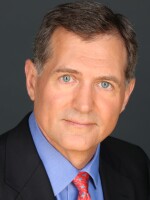ARI SHAPIRO, HOST:
The leaders of Ukraine are gaming out where the war with Russia goes from here. Fighting in the east has slowed to a bloody slog. The capital is relatively safe from Russian attacks. So what does Ukraine want now? NPR's Greg Myre met with one of President Volodymyr Zelenskyy's top advisers at Kyiv's presidential compound today and asked him that question. Hi, Greg.
GREG MYRE, BYLINE: Hi, Ari.
SHAPIRO: Tell us about this adviser you met with. Who is he?
MYRE: Yeah, our NPR team sat down with a senior presidential adviser, Mykhailo Podolyak. Now Kyiv, the city, feels more or less normal these days, but this ends the moment you enter the presidential compound. And it's not just the security outside. Inside the building, the sandbags are six feet high. They're stacked on windowsills, blocking out the sun from these tall windows. Most of the lights are off. The hallways are dark and mostly empty. When we finally got to Podolyak's office, he's like a lot of people in the Zelenskyy administration, young and casual. He's in a black T-shirt that reads fight like Ukrainians. He says he's working around the clock. There were several pairs of sneakers next to his desk cluttered with papers.
SHAPIRO: That is such a vivid scene. And what did he say to you? How did he feel about the state of the war right now?
MYRE: So Podolyak is the chief negotiator for Ukraine. So you think he might want to talk about possible peace negotiations, but he sees no prospect right now. So what he really wanted to talk about was weapons. Here he is.
MYKHAILO PODOLYAK: (Through interpreter) Now we see that this is truly a war of artillery, and we see that they are shooting by a ratio of 10 or 15 to 1. Again, the math is clear. We will need parity of weapons if we're going to be effective in any sort of counteroffensive.
MYRE: This Russian artillery advantage has allowed them to make some grinding progress in the Donbas region in the eastern part of the country. So the outgunned Ukrainians are making a big push right now for more weapons. And this comes on the eve of a NATO meeting Wednesday in Brussels.
SHAPIRO: All right. So Ukraine wants more artillery fast. What are the chances they're going to get it?
MYRE: Well, Podolyak tweeted out a wish list on Monday. It includes a thousand howitzers, a thousand drones, 500 tanks, and it goes on from there. So NATO is not going to meet those demands in full. The U.S. and others are still sending weapons but in much smaller quantities. Podolyak says Ukraine has a real problem right now. It's running low on ammunition for it's old Soviet-era weapons. Russia is really the only place that makes this kind of ammunition anymore. So here he is again.
PODOLYAK: (Through interpreter) Russia has the overwhelming majority of these artillery-type weapons. What there is no shortage of in the world are NATO standard weapon, whether it be in the U.S. or in Western Europe or in Asian countries.
MYRE: So the longer this war goes on, Ukraine will be relying less on its old Soviet weapons and more on its modern NATO weapons.
SHAPIRO: All right. Well, the U.S. and Europe are starting to have conversations about how an end to this war could be negotiated. How is Ukraine receiving that?
MYRE: Ari, it's really a nonstarter. I asked Podolyak, and here's what he said about the Russians.
PODOLYAK: (Through interpreter) The reason that they do not want to negotiate anymore is because they're trying to get concessions from the West to freeze the conflict where it is so that they can claim victory.
MYRE: So we finished up our conversation with Podolyak. We were heading toward the door, and then he stopped us and offered one last comment. He said, if you get anything out of this interview, its weapons, weapons, weapons.
SHAPIRO: That's NPR's Greg Myre in Kyiv. Thanks a lot.
MYRE: My pleasure. Transcript provided by NPR, Copyright NPR.






